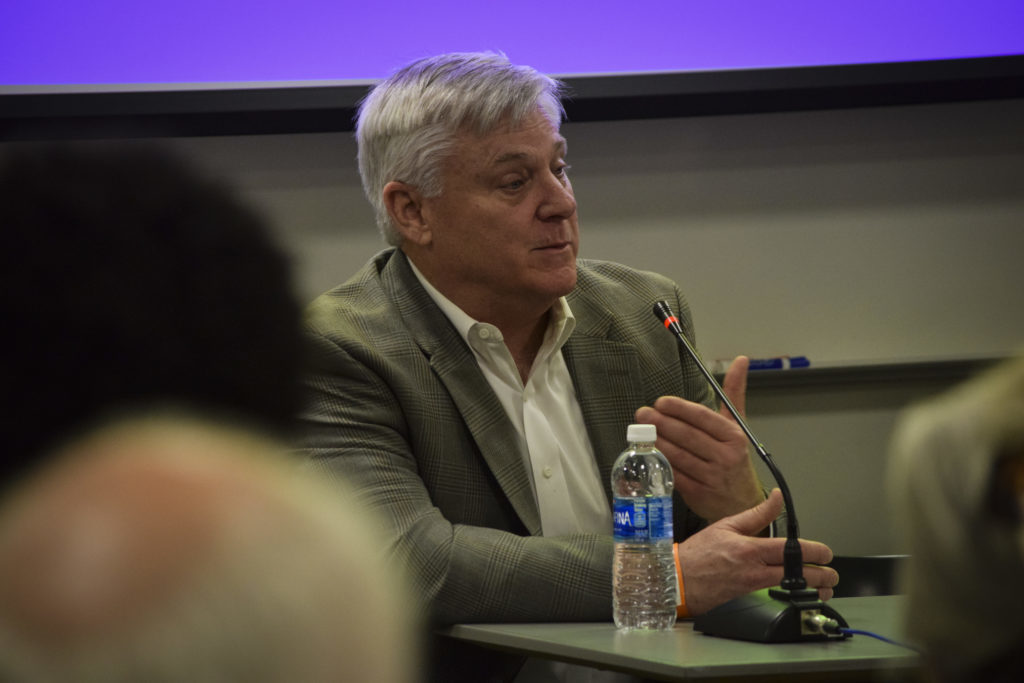Updated: Feb. 25, 2017 at 12:52 a.m.
Some community members are opposing a proposed emergency helipad at GW Hospital, fearing noise from medical helicopters will disrupt the neighborhood.
A handful of neighbors criticized the proposal at a Foggy Bottom Association meeting Tuesday night, saying the noise would be a nuisance and a potential safety concern for those who live near the hospital. A top hospital official said the helipad would allow medical staff to transport patients, and the helicopters would generate less noise than passing ambulances.
The proposal calls for a helipad to be constructed on the roof of the south side of the hospital, just above the Foggy Bottom Metro exit. Babak Sarani, the director of trauma and acute care surgery at the hospital who spoke at Tuesday’s meeting, said the helipad would be used about two to three times per week.
Sarani said GW Hospital was one of only two District hospitals fully equipped to treat patients with traumatic injuries – called level one trauma care – and that the hospital frequently admits patients sent from other hospitals that have reached capacity or don’t have adequate resources to treat a particular patient.
Sarani said the helipad could shave potentially life-saving minutes off the transport time for a critically injured or sick patient. Ambulances deal with traffic while transporting patients, he said.
“They land at the south street heliport, which is near the Nationals Stadium. They then rendezvous with an ambulance that brings them up to us,” he said. “Which works well, except it doesn’t work if you are bleeding to death. Too much time.”
Sarani first proposed the idea of an emergency helipad in 2012, he said.
No start date for the helipad construction has been set, Sarani said. For construction to begin, the D.C. Council must first reverse a 30-year-old ban on hospitals building new helipads. Legislation has already been introduced to repeal the ban, and it was referred to the Committee of the Whole in the Council for debate.
D.C. Park Police, which controls the airspace around the hospital, has already signed off on the project.
Two other D.C. hospitals, MedStar Washington Hospital Center and Children’s National Medical Center, have helipads.
Marina Streznewski, the president of the FBA, said she initially opposed GW Hospital’s proposal because of noise concerns, but changed her mind after learning more about the project.
“The helicopters are not going to be like the military helicopters or the park service helicopters that we hear, which are big and loud,” she said. “Given the minimal impact on the quality of life and the enormous impact on the city’s disaster management planning, I really think it’s a good idea. “
Streznewski said the helipad would be helpful in the event of a mass-casualty event in the District. In 2013, the hospital’s trauma center treated victims of the Washington Navy Yard shooting, but most were taken to MedStar Washington Hospital Center because patients could be airlifted there.
Other neighbors said it was dangerous to have helicopters take off and land in a heavily-populated urban area and that the noise from low-flying helicopters would disrupt area residents’ quality of life.
Lt. Col. Mike Conklin, a retired Marine who briefly piloted Marine Force One during the Clinton administration, was invited to speak to neighbors about how the helicopters would operate and their regulations.
He told attendees that helicopter pilots would never take off if the weather is dangerous enough to cause a crash.
“If it’s not safe to fly, you don’t fly,” he said.
Conklin and Sarani also referred to a study conducted by Union Memorial Hospital in 2007 that showed that the models of helicopters used for medical transportation generate about 75 to 90 decibels of noise. The average ambulance siren, in contrast, reaches about 100 to 120 decibels.
They said that by reducing the need for transferring patients by ambulance, the helipad would lower the level of noise pollution.
To get a better idea of the possible impact on the community, Sarani said officials will conduct a noise test April 19.
Conkin added that any sound generated by the helicopter would only last briefly during landing and takeoff.
“You’re talking about less than five minutes total of noise exposure,” he said. “I guarantee you everybody in this room would want that helicopter if that was your loved ones that needed it at that time.”
This post was updated to reflect the following correction:
The Hatchet incorrectly published a photo of Dr. Babak Sarani instead of Lt. Col. Mike Conklin. We regret this error.





